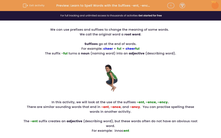We can use prefixes and suffixes to change the meaning of some words.
We call the original word a root word.
Suffixes go at the end of words.
For example: cheer + ful = cheerful
The suffix -ful turns a noun (naming word) into an adjective (describing word).

In this activity, we will look at the use of the suffixes -ent, -ence, -ency.
There are similar sounding words that end in -ant, -ance, and -ancy. You can practise spelling these words in another activity.
The -ent suffix creates an adjective (describing word), but these words often do not have an obvious root word.
For example: innocent
The suffixes -ence and -ency create nouns.
For example: emergency, independence
But how do we know when to use -ent, -ence, -ency rather than -ant, -ance, and -ancy?
If the suffix comes after a soft c, soft g, or qu sound, that usually means that it uses -ent, -ence, -ency.
For example decent, emergency, frequent.
Another rule is that -ent is used when there is a related word in the same family that has a clear e (as in bed) sound in the right place.
For example: we know that confident uses -ent, rather than -ant, because of the word confidential - there is a clear 'e' sound in this word.
However, there are many words which don't follow these rules and just have to be learnt!
Try writing the word down both ways and seeing which looks right. The more you read, the better you will become at this!

Here are some examples of words that use these suffixes that we will practise in this activity:
innocent
innocence
frequent
frequency
confident
And the exceptions:
obedient
independent
You can listen to them here:
You can break the words up into the root and suffix to help you to spell them:
innoc ent
innoc ence
frequ ent
frequ ency
confid ent
obedi ent
independ ent
Use Look, Say, Cover, Write, Check to practise spellings a few times before we begin the activities.









